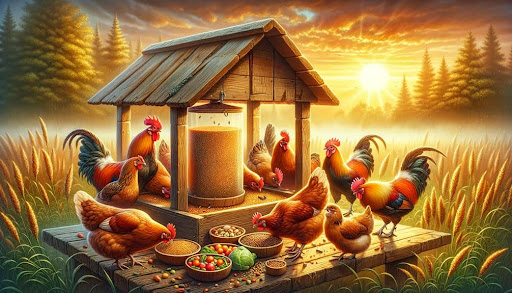Did you know that chickens can consume up to 120 grams of feed daily? Ensuring this feed is balanced with essential nutrients can significantly impact their health and productivity. You need to include proteins, vitamins, minerals, and fats in their diet to support growth and egg production. Without these nutrients, your chickens might not thrive as they should. But what exactly makes up a well-rounded chicken feed, and how can you meet their dietary needs effectively? Let’s explore the key components to help your flock maintain optimal health.
Essential Nutrients
For a balanced diet, chickens need a variety of essential nutrients, including proteins, vitamins, minerals, and fats, to maintain optimal health and productivity. One critical aspect of feeding chickens is ensuring proper nutrient absorption, which directly impacts their digestive health. You’ll want to focus on providing a diet that enhances the efficiency of their digestive system.
Consider the role of vitamins and minerals. Vitamins such as A, D, E, and K are fat-soluble and essential for various bodily functions. For instance, vitamin A supports vision and immune function, while vitamin D is crucial for calcium absorption, promoting strong bones. Minerals like calcium and phosphorus are vital for eggshell formation and skeletal strength.
Fats are another essential nutrient, acting as a concentrated energy source and aiding in the absorption of fat-soluble vitamins. Including healthy fats in the diet ensures chickens have the energy to support daily activities and growth.
To optimize nutrient absorption, ensure the feed is of high quality and easily digestible. Incorporate prebiotics and probiotics to maintain a healthy gut flora, which plays a significant role in nutrient breakdown and absorption. By focusing on these essential nutrients, you’ll maintain your chickens’ digestive health and overall well-being.
Protein Requirements
Understanding the protein requirements for chickens is fundamental to ensuring their growth, muscle development, and egg production. Chickens need a balanced diet with sufficient protein to thrive. Protein is vital for tissue repair, enzyme production, and overall health. For optimal results, you should include various protein sources in their diet.
Animal-based protein sources, such as fish meal and meat by-products, provide high-quality protein that’s easily digestible. Plant-based options, like soybean meal and alfalfa, also contribute significantly to the protein content but should be complemented by other ingredients to achieve dietary balance. A well-rounded diet ensures that chickens receive all essential amino acids necessary for their development.
Chickens at different life stages require varying protein levels. For instance, chicks need around 20-22% protein for proper growth, while adult laying hens benefit from a diet containing 16-18% protein to maintain egg production.
Balancing protein in the diet not only supports physical growth but also bolsters the immune system, making chickens more resilient to diseases. By carefully selecting and combining protein sources, you can meet your chickens’ dietary needs effectively, promoting robust health and productivity in your flock.
Vitamin and Mineral Needs
Ensuring chickens receive adequate vitamins and minerals is crucial for their overall health and productivity. Chickens need a variety of vitamins, including A, B, and E, but Vitamin D stands out due to its role in calcium absorption. Without sufficient Vitamin D, chickens can’t properly absorb calcium, leading to weakened bones and poor eggshell quality. To maintain optimal calcium levels, ensure your chickens have access to sunlight or a Vitamin D supplement, as it’s synthesized in their skin through UV exposure.
Monitoring calcium levels is essential, especially for laying hens. Calcium is a key component of eggshells, and a deficiency can lead to soft or malformed eggs. Provide a calcium supplement, such as crushed oyster shells or limestone, mixed into their feed. This will help meet their daily calcium requirement and support strong eggshell formation.
In addition to calcium and Vitamin D, chickens also need trace minerals like phosphorus, magnesium, and zinc for metabolic functions. You can provide these through a balanced commercial feed or by adding mineral-rich supplements. Always ensure fresh water is available, as it aids in the absorption and utilization of these vital nutrients.
Types of Chicken Feed
A well-rounded understanding of the types of chicken feed available can significantly impact your flock’s health and productivity. Different feeds cater to various life stages and nutritional needs. Starter feed, rich in protein, is crucial for chicks, while grower feed helps adolescents develop. Layer feed, high in calcium, supports egg-laying hens, and broiler feed optimizes meat production.
Commercial brands offer a range of scientifically formulated feeds. They ensure a balanced mix of proteins, vitamins, and minerals. For instance, Purina, Nutrena, and DuMOR are reputable brands providing reliable options. Commercial feeds are convenient and consistent, making them ideal for maintaining flock health.
Organic options are increasingly popular for those seeking natural feeding methods. Organic feeds are free from synthetic additives, pesticides, and GMOs. Brands like Scratch and Peck and New Country Organics provide high-quality organic feed. While often more expensive, organic options can promote better overall health and reduce chemical exposure.
In choosing between commercial brands and organic options, consider your flock’s specific needs, your budget, and your personal preferences. Both types offer unique benefits, ensuring your chickens receive the nutrition they need for optimal growth and productivity.
Homemade Feed Recipes
Creating homemade feed recipes allows you to tailor specific nutritional profiles to meet your chickens’ unique dietary needs. Start by sourcing high-quality ingredients such as grains, legumes, seeds, and mineral supplements. Corn, wheat, and barley serve as excellent energy sources, while soybean meal and fish meal provide necessary protein. Don’t forget calcium-rich ingredients like ground oyster shells and limestone to support eggshell formation.
When mixing your feed, use a balanced ratio: 50% grains, 30% protein sources, and 20% greens and minerals. Ensure the mixture is homogeneous to prevent selective feeding, which could lead to nutrient deficiencies. It’s crucial to store the feed properly to maintain its nutritional value. Use airtight containers and keep them in a cool, dry place to prevent mold growth and pest infestation.
Ingredient sourcing can be streamlined by purchasing bulk quantities from reputable suppliers. Local farms, agricultural stores, or online markets are viable options. Always check for freshness and quality to ensure your chickens receive the best nutrition. Regularly rotate your stock to use older supplies first, minimizing waste and maintaining feed efficacy. By carefully crafting and storing homemade feed, you provide optimal nutrition tailored to your flock’s needs.
Conclusion
To ensure your chickens thrive, focus on providing a balanced diet. Prioritize high-quality protein sources for muscle development, essential vitamins like A, D, E, and K for overall health, and minerals such as calcium and phosphorus for strong bones and egg production.
Explore different types of commercial feeds or consider homemade recipes. By consistently offering a nutrient-rich diet, you’ll promote growth, enhance productivity, and maintain the well-being of your flock.






